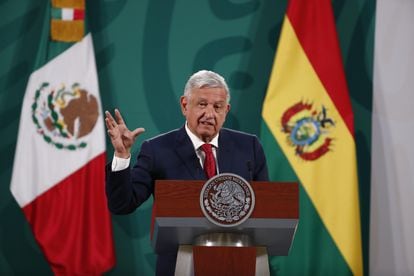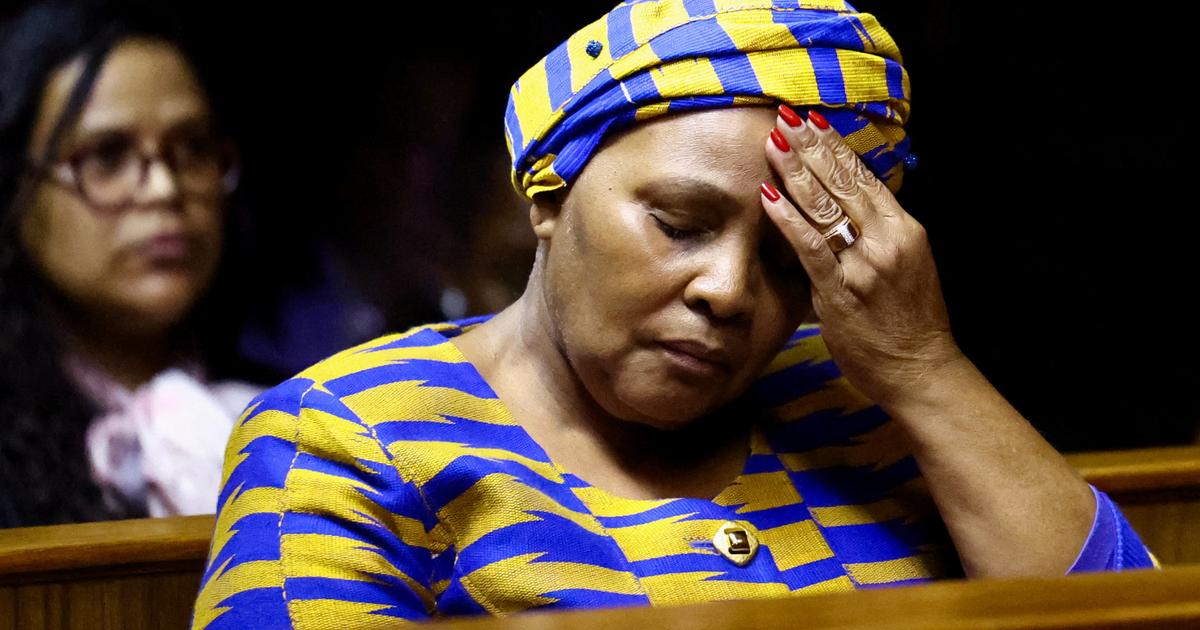President López Obrador, this Wednesday at the National Palace of Mexico City.José Méndez / EFE
President Andrés Manuel López Obrador is getting stronger politically, but paradoxically the chances of bringing his economic and social transformation project to fruition are diminishing in the same proportion.
Today Mexico is experiencing a dangerous divorce between politics and economics.
And that is the weakness of such a powerful president.
Let's start with the first.
Everything indicates that the president will emerge stronger from the decisive midterm elections to be held this summer, which would make his weight even more prominent in the remainder of the six-year term.
On the one hand, the polls indicate that Morena, the party in power, will sweep the governorships (it has a favorable prognosis in 13 of the 15 that will be in dispute) and there is little doubt that it will maintain the majority in Congress (it remains to be seen if it will achieve the qualified majority that allows constitutional changes or only the simple majority, which would force you to negotiate them).
The other power factors have gradually been aligned or neutralized: the Army has become a privileged ally;
the judiciary is on the defensive and the Supreme Court is swinging towards the obradorismo;
the Biden government, which could be a counterweight, has suddenly lost a bit of negotiating capacity in the face of the domestic political crisis that Central American migration has generated, where Mexico plays a strategic role;
businessmen are disunited and somewhat frightened by a punitive fiscal policy in which many of them have a vulnerable past;
Opposition parties far from recovering from the 2018 debacle appear to be even more weakened.
And as important as all of the above: the president maintains his popularity intact, despite the pandemic, the scandals, the adverse propaganda and the calamitous year we have lived through.
In short, the public scene is largely that of one man.
However, at the same time, it is about a man who is increasingly unable to carry out his ambitious project: to establish a regime capable of causing a substantive change in the lives of the poorest.
The president sought to create the conditions for a better distribution of wealth but to do so without violence, without radical expropriations and without depriving wealthy sectors of theirs.
I wanted to do it, yes, suppressing bad practices and limiting the parasitically grown business community to the shadow of public power.
But at no time was there, nor has been, a redistribution of wealth, taking from some to give it to others.
Not even a more progressive tax reform was conceived, as is done in Europe, to tax big capital for the benefit of those below.
This being the case, the only possibility of improving the endowment that those with the least have was to increase wealth.
One part would come out of the fight against corruption, but another would have to be the result of a new economic expansion.
The president really believed that the country would grow as soon as the purchasing power of the popular sectors was stimulated.
The government's economic proposal at the start of the six-year term was not bad and it was certainly fairer.
It sought to reactivate the market through huge social transfers capable of increasing the income of the popular sectors and, therefore, demand.
It was a measure of social justice, but also a way to encourage the productive expansion of the business sector.
To this stimulus to private investment would be added a favorable climate through healthy public finances, contained inflation, stable taxes and a solid currency.
His Mayan Train or his investment project in the Isthmus tried to become punctual triggers to alleviate the lack of investment in marginal regions.
That was the plan.
The pandemic swept him away.
We will never know what the real impact of the 4Q economic proposal would have been.
Nothing can withstand a tsunami capable of collapsing production in that way.
With or without López Obrador, and there are similar rates of more solid European countries, the collapse would have been brutal.
The 9% that the GDP fell is not surprising in an economy so sensitive to tourism, oil, commercial exchange and so affected by the presence of the informal sector.
The tension between the elites, during and after the pandemic did the rest.
The political power and the economic power could not agree to agree to a truce or to meet halfway.
Both have each entrenched themselves in their own strengths: López Obrador has grown politically stronger;
for their part, businessmen have taken a step back and taken a more passive attitude, some out of precaution, others out of irritation.
The truth is that the economic sluggishness that we are experiencing, in practice muzzles the ambitious and well-intentioned plans of the president.
Today the huge social transfers are more a matter of welfare and social ethics;
they only serve to alleviate poverty, but they are far from being a reviving factor capable of boosting the economy.
Perhaps they would have been under other conditions.
Today there are more poor people than in 2018.
At this time, the entire power of the president is unable to infuse the economy with the levels of investment and job creation that are needed to activate depressed regions and lift depressed sectors out of poverty.
There is no way to grow without investment, in the same way that you cannot harvest without having sown;
and both public and private investment have been depressed for two years and with no significant change in sight.
Faced with this situation, the president seems determined to change what he can, that is, what his expanded political powers allow him: the legal and institutional structure to establish a regime less inclined to the elites.
Hence his insistence on constitutional changes or on handing over future benefits from infrastructure works to the Army to avoid their privatization.
It cannot mandate employers to invest or create jobs, but it can dictate higher minimum wages and better benefits to be effective when such jobs are created again.
Three difficult years await us.
A politically strong and economically bound president determined to achieve, even by jerks and pulls, a fairer institutional scaffolding for impoverished Mexicans.
Substantive results in daily life for all of them will be scarce.
It is not a small thing, but it falls short of expectations.
In 2024 we will see the collision of those who want to reverse the changes to undo this scaffolding and those who wish to land them under more favorable conditions.
But that is another story.
@jorgezepedap
Subscribe here
to the
newsletter
of EL PAÍS México and receive all the informative keys of the current situation of this country





